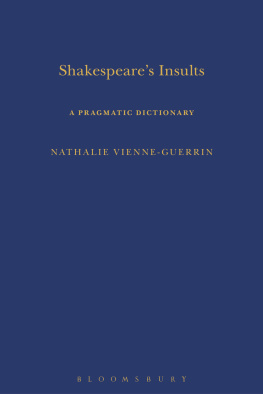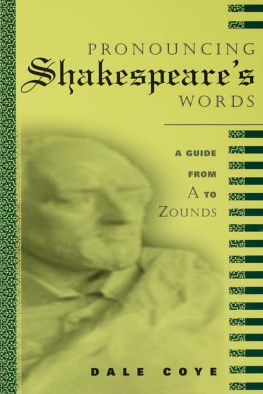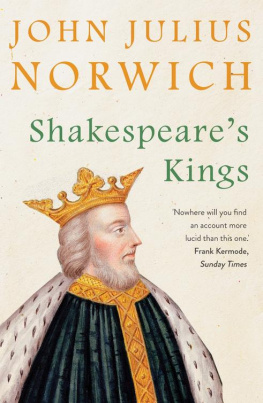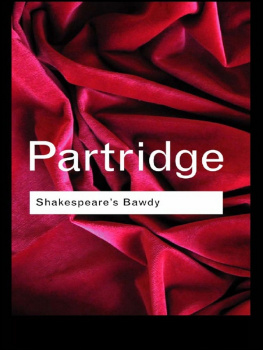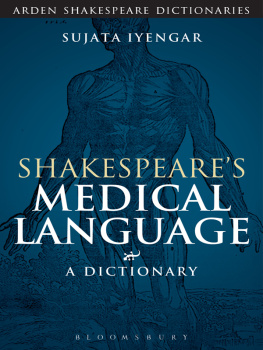To Serge, Pierre, Franois, Clment, Nicolas and Sophie, with loads of love
ARDEN SHAKESPEARE DICTIONARIES
SERIES EDITOR
Sandra Clark (Birkbeck College, University of London)
Class and Society in Shakespeare Paul Innes
Military Language in Shakespeare Charles Edelman
Shakespeares Books Stuart Gillespie
Shakespeares Demonology Marion Gibson
Shakespeares Insults Nathalie Vienne-Guerrin
Shakespeare and the Language of Food Joan Fitzpatrick
Shakespeares Legal Language B. J. Sokol and Mary Sokol
Shakespeares Medical Language Sujata Iyengar
Shakespeares Non-Standard English N. F. Blake
Shakespeares Plants and Gardens Vivian Thomas and Nicki Faircloth
Shakespeares Political and Economic Language Vivian Thomas
Shakespeares Theatre Hugh Macrae Richmond
Women in Shakespeare Alison Findlay
FORTHCOMING TITLES :
Shakespeare and Domestic Life Sandra Clark
Shakespeare and National Identity Christopher Ivic
Shakespeare and Visual Culture Armelle Sabatier

Contents
My first thanks must go to Sandra Clark, Series Editor of the Arden Shakespeare Dictionary Series, for her trust, her generous help and constant support and to Margaret Bartley, publisher of the Arden Shakespeare, for her benevolent patience.
This book is the fruit of many years of work on Shakespeares insults. This work started under the supervision of Pierre Iselin when I was a PhD student. I remain grateful to him for accompanying me during so many joyful years of research.
The idea for this dictionary emerged when I was a lecturer at the university of Rouen, and I would like to give warm thanks to my faithful friends Michle Willems and Raymond Willems for encouraging me from the beginning of this project to the end.
Finishing this dictionary at the university of Montpellier, I also wish to thank my Montpellier friends and colleagues. I am deeply grateful to the members of the Institut de Recherche sur la Renaissance, lge Classique et les Lumires ( IRCL , UMR 5186 CNRS /Universit Paul-Valry Montpellier 3) for the help and support they have given me, particularly in the final months of this work. I warmly thank Jean-Pierre Schandeler, Brigitte Belin and Vanessa Kuhner-Blaha for their invaluable human and logistic support, without which I could not have put the finishing touches to this book. My deep gratitude also goes to my Montpellier friends and research companions, Janice Valls-Russell and Yves Peyr who have constantly helped me during the last six years; to Florence March and Jean-Christophe Mayer, with whom it is a pleasure to work; and Bndicte Louvat-Molozay, Nick Myers and Alban Dlris for their understanding support and friendship. It is a great privilege to work with such a team, in such a stimulating research environment, with the invaluable support of the CNRS and of the Universit Paul-Valry, whose Conseil Scientifique and Conseil dAdministration I wish to thank for generously granting me research leave (from January to June 2014). This sabbatical was essential for me to finish this dictionary. I also want to thank my colleagues and students from the English department, especially its director Claire Omhovre, for allowing me to put my teaching and administrative tasks aside to focus on this research project. Many thanks to Myriam Carminati, Director of the UFR 2 for her support and understanding.
I also wish to thank other colleagues who have encouraged and helped me in one way or another on this long journey: Leo Carruthers, velyne Larguche, Franois Laroque, Ann Lecercle, Jean-Marie Maguin, Marie-Madeleine Martinet, Patricia Parker and Christopher R. Wilson. I am grateful to Dominique Goy-Blanquet and the members of the Socit Franaise Shakespeare for giving me the opportunity to discuss my methods and ideas at the SFS congress on Shakespeares tongue in March 2013.
I wholeheartedly thank my dear friend and colleague Victoria Bladen for her generous help in correcting this book.
My deepest gratitude goes to my friend the best friend in the world and colleague Sarah Hatchuel, for the unfailing support she has given me since 1998. It is a real treat to work with her, and her friendship is invaluable.
Finally, I owe a huge debt of gratitude to my family for their unfailing patience, love and support: my mother, Genevive Vienne, my brothers (Jean-Paul and Frdric Vienne) and my sisters (Catherine Fortin and Fanette Devin).
I wholeheartedly thank my children, Pierre, Franois, Clment, Nicolas and Sophie, for their incredible patience, and my husband, Serge Guerrin, for his love and patient understanding.
The Arden Shakespeare Dictionaries aim to provide the student of Shakespeare with a series of authoritative guides to the principal subject areas covered by the plays and poems. They are produced by scholars who are experts both on Shakespeare and on the topic of the individual dictionary, based on the most recent scholarship, succinctly written and accessibly presented. They offer readers a self-contained body of information on the topic under discussion, its occurrence and significance in Shakespeares works, and its contemporary meanings.
The topics are all vital ones for understanding the plays and poems; they have been selected for their importance in illuminating aspects of Shakespeares writings where an informed understanding of the range of Shakespeares usage, and of the contemporary literary, historical and cultural issues involved, will add to the readers appreciation of his work. Because of the diversity of the topics covered in the series, individual dictionaries may vary in emphasis and approach, but the aim and basic format of the entries remain the same from volume to volume.
Sandra Clark
Birkbeck College
University of London
1. Shakespeares Works |
AC | Antony and Cleopatra |
AW | Alls Well That Ends Well |
AYL | As You Like It |
CE | The Comedy of Errors |
Cor | Coriolanus |
Cym | Cymbeline |
Ham | Hamlet |
1H4 | King Henry IV, Part 1 |
2H4 | King Henry IV, Part 2 |
H5 | King Henry V |
1H6 | King Henry VI, Part 1 |
2H6 | King Henry VI, Part 2 |
3H6 | King Henry VI, Part 3 |
H8 | King Henry VIII |
JC | Julius Caesar |
KJ | King John |
KL | King Lear |
LLL | Loves Labours Lost |
Luc | The Rape of Lucrece |
MA | Much Ado about Nothing |
Mac | Macbeth |
MM | Measure for Measure |
MND | A Midsummer Nights Dream |
MV | The Merchant of Venice |
MW | The Merry Wives of Windsor |
Oth | Othello |
Per | Pericles |
R2 | King Richard II |
R3 | King Richard III |
Rom | Romeo and Juliet |
Son | Sonnets |
TC |
Next page
